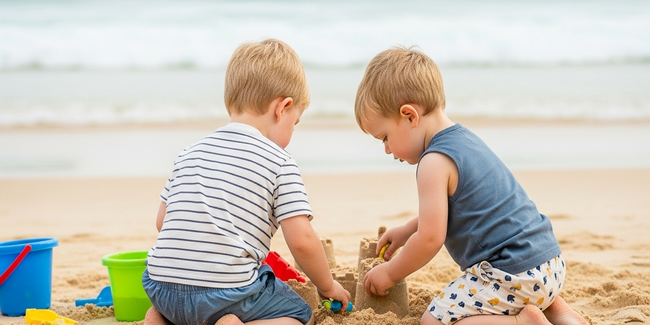Ever watched your toddler navigate a playdate and felt that familiar mix of pride and apprehension? One moment they are happily engaged, the next a disagreement over a single red block erupts into a world-ending crisis. You’re not alone. Fostering social skills like sharing, empathy, and cooperation is one of the most important—and challenging—parts of the toddler years. The good news is, the best tools are not in a textbook; they are already in your toy box, your backyard, and your daily interactions.
This article empowers you with an educator’s perspective on social development, transforming everyday play into powerful opportunities for your child to learn how to connect, cooperate, and care for others. As early childhood educators with over 15 years of experience in managing high-quality centres, we’ve seen firsthand how intentional, play-based learning builds the foundation for a lifetime of healthy relationships. We’ll move beyond just listing games to explain the ‘why’ behind each activity, giving you the confidence to guide your child’s social journey.
The ‘Why’ Behind the Play: Understanding Your Toddler’s Social Universe
Before we can effectively guide toddlers, we must first understand the world from their perspective. A common concern we hear from families is whether their child’s reluctance to share or their preference for playing alone is “normal.” The answer is almost always a resounding yes. Toddlerhood is not a race to perfect social grace; it’s a gradual, fascinating process of discovery.
The journey begins with what educators call parallel play. Imagine two talented chefs working in the same kitchen. They aren’t collaborating on a dish, but they are aware of each other, perhaps occasionally borrowing a tool or observing a technique. They are comfortable in the shared space, focused on their own creations. This is your young toddler. They are learning to be with others before they are ready to play with others. This stage is a critical foundation, building comfort and observational skills in a group setting.
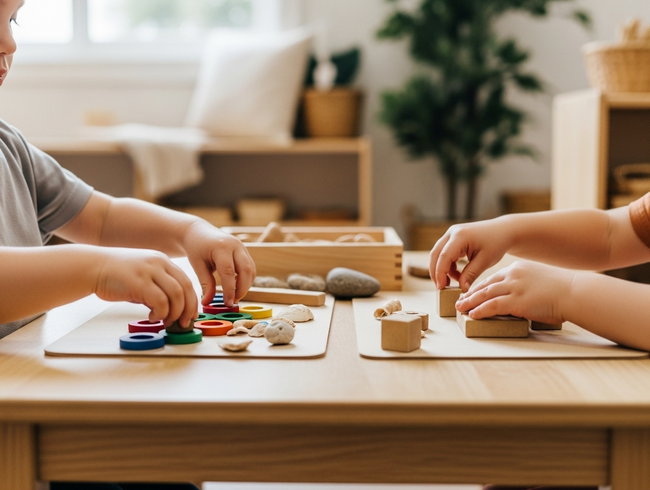
From here, children progress toward associative play and eventually, cooperative play. This is the shift from individual chefs to a full culinary team working together on a banquet. They must now communicate a shared vision, negotiate roles (“You chop the carrots, I’ll stir the sauce”), and work toward a common goal. This leap doesn’t happen overnight. It requires a developing understanding of others’ perspectives, the ability to delay gratification, and emerging communication skills.
This entire developmental arc is beautifully captured in the Early Years Learning Framework’s (EYLF) vision of supporting children’s sense of “Belonging, Being, and Becoming.” By creating safe spaces for parallel play, we foster a sense of Belonging. By honouring their current stage of development, we allow them to simply Be. And by gently introducing games that encourage collaboration, we support them in Becoming socially competent and confident individuals.
The Educator’s Toolkit: Games That Build Core Social Skills
True social learning isn’t about forced apologies or timed turn-taking. It’s about creating joyful experiences where skills like cooperation and empathy are the natural outcomes of having fun. Our approach, which meets the National Quality Standards, focuses on intentional teaching within play. Here are some simple, powerful games organised by the specific skills they nurture.
A. Building Cooperation & Turn-Taking
These games teach the foundational rhythm of social interaction: give and take, wait and act.
- Game 1: The Rolling Ball. The simplest games are often the most profound. Sit opposite your toddler and roll a ball back and forth. This isn’t just a motor skills activity; it’s a conversation without words. It teaches anticipation, the joy of a predictable return, and the basic structure of turn-taking. As you play, narrate the action: “My turn to roll… now it’s your turn! You rolled it right to me!”
- Game 2: Cooperative Block Building. Instead of building separate towers, start one tower together. The rule is simple: one person adds a block at a time. This small shift transforms the activity from an individual project into a shared goal. It introduces negotiation (“Where should the blue one go?”) and shared ownership of the final creation (or the inevitable, joyous crash!).
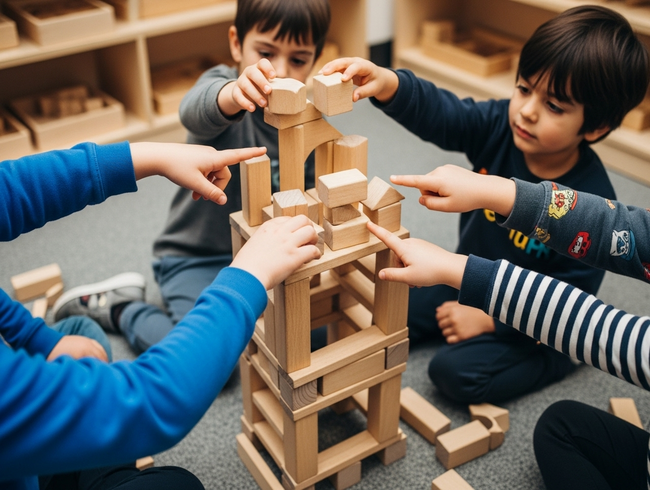
- Game 3: The “Helper” Game. Involve your toddler in simple household tasks. “Can you help me put the books on the shelf?” or “Let’s work together to put your toys in the basket.” This isn’t a chore; it’s a collaborative effort that gives them a sense of purpose and competence within the family unit, teaching them the value of working with others.
B. Nurturing Empathy & Emotional Understanding
Empathy is the bedrock of kindness. Many parents ask how to teach empathy to a 2 year old, and the answer lies in understanding that it’s an ability we can intentionally cultivate through play.
- Game 4: Puppet Feelings. Use puppets or favourite stuffed animals to act out simple social scenarios. One puppet can be sad because it can’t reach a toy, while another can be excited about going to the park. Ask your child, “How do you think Teddy is feeling? What could we do to help him feel better?” This provides a safe, low-pressure way to explore complex emotions and problem-solve from another’s perspective, a key principle of ACECQA’s Quality Area 5 (Relationships with Children).
- Game 5: “Doctor, Doctor!” Caring for a “sick” teddy bear or doll is a powerful empathy-building exercise. Your child gets to practice gentleness, use soothing words, and consider the needs of another being. This pretend play allows them to step into a caregiving role, actively rehearsing the very behaviours we want to foster.
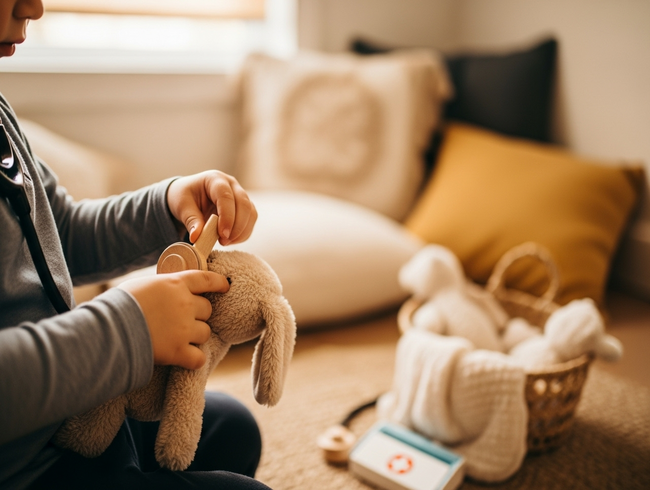
C. Developing Communication & Negotiation
Effective social interaction hinges on the ability to express one’s own needs and understand the needs of others.
- Game 6: Collaborative Storytelling. Start a story with a single sentence: “Once upon a time, there was a little frog who lived near a big, blue ocean…” Then, invite your child to add the next sentence. This back-and-forth game teaches listening, respecting others’ ideas, and building on them to create something new together.
- Game 7: The “Two-Person” Puzzle. Choose a simple puzzle and work on it together. This requires constant communication. “I think I have a corner piece,” or “Does this red piece fit here?” It models how to work toward a solution by sharing information and trying different strategies as a team.
Leveraging Our Sunshine Coast Playground for Social Learning
One of the greatest assets we have on the Sunshine Coast is our incredible natural environment. The beach and bushland are not just beautiful backdrops; they are dynamic, engaging “third teachers” that naturally promote social development.
The principle of using the environment to spark collaborative play is central to our philosophy. For instance, building a sandcastle is a natural team-building exercise. The sand is an open-ended material that invites shared creation. Children must negotiate roles—who will dig the moat, who will fetch water, who will decorate with shells? The sun, the waves, and the sheer scale of the beach encourage a sense of shared adventure that is hard to replicate indoors.
Similarly, a walk through Alex Forest Bushland Park can become a cooperative scavenger hunt. Working in pairs to find a smooth stone, a feather, or a uniquely shaped leaf encourages communication and shared focus. This aligns with our belief that authentic, play-based learning in nature provides rich, unscripted opportunities for children to practice social skills in a meaningful context.
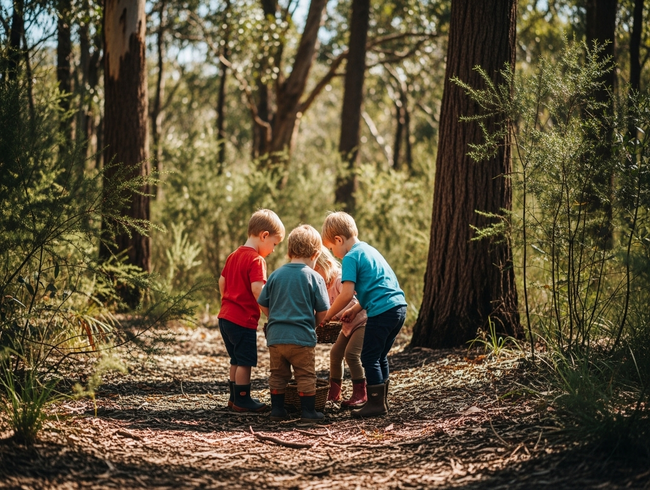
Guiding Through Challenges: An Educator’s Perspective
Conflict is not a sign of failure; it’s a sign of learning. When a disagreement over a toy arises, our role as guides is not to immediately solve the problem, but to coach the children through it.
Instead of a simple “You need to share,” try sportscasting the situation from a neutral, respectful perspective. “I see two friends who both want the red truck. Ben, you have the truck now, and Tom, you look very sad that you don’t have it.”
This approach does three crucial things:
- It validates feelings: Both children feel heard and understood.
- It defines the problem: It clearly states the issue without placing blame.
- It opens the door for problem-solving: From here, you can guide them. “I wonder what we could do? Tom, could you ask Ben for a turn when he is finished?”
This method reflects the high standards for fostering respectful and equitable relationships required by the National Quality Framework. It empowers children to develop their own conflict-resolution skills, a far more valuable lesson than simply being told what to do.
Your Role as Your Child’s First and Most Important Social Guide
The games and strategies we’ve shared are powerful tools, but the most important element in your child’s social development is you. By modelling kindness, narrating your own feelings (“I’m feeling a little frustrated that I can’t open this jar”), and celebrating acts of cooperation, you create a home environment where positive social skills are lived and breathed every day.

At Okinja Early Learning Centre & Kindergarten, this philosophy of intentionally nurturing social and emotional competence through authentic, play-based experiences is at the very heart of what we do. Our curriculum isn’t a list of activities, but a responsive approach guided by the Early Years Learning Framework that sees every interaction as a learning opportunity. We believe that by creating a warm, stimulating, and safe extension of the family home, and by partnering with parents, we can provide the complete foundation for your child to develop the confidence and skills needed to build meaningful connections.
Ready to see how purposeful play builds brilliant minds? We invite you to book a tour to experience our unique learning environments and see how our educators bring the Early Years Learning Framework to life. Contact Okinja today on 07 5479 2222 or email admin@okinjaelc.com.au to learn more.

